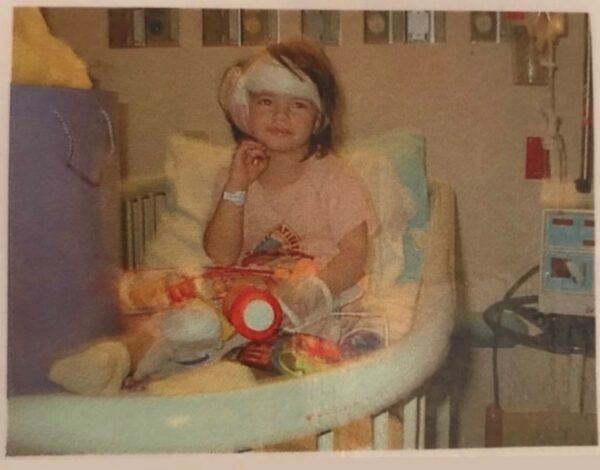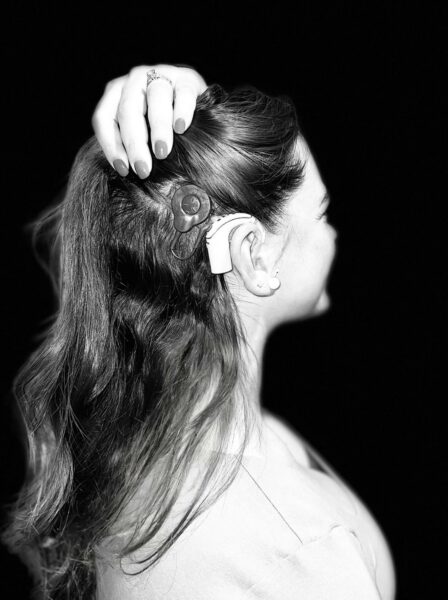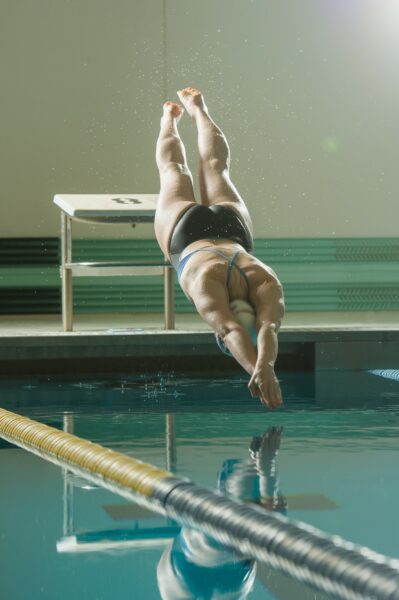In the past, hearing tests for newborns were non-standardized, which is why Mia’s bilateral profound deafness went undiagnosed. Having a supportive family and audiologist, Mia tried solutions like hearing aids, but they were ineffective. Once she received a cochlear implant her world opened up and she now feels empowered and inspired to educate others on hearing loss. Read more:
“My name is Mia and I was born with bilateral profound deafness. In the 1990s, hearing tests were not a standard part of the newborn screening, so my deafness went undiagnosed until I was 15 months old (after seeing multiple doctors). After much thought and consideration by my parents, it was decided that I would attend DePaul School for Hearing & Speech. Beginning at 18 months old, I attended DePaul for my oral education and trained in lip reading. I wore hearing aids in both ears, but they were ineffective as a treatment for my profound deafness.
 Candidacy for a cochlear implant
Candidacy for a cochlear implant
Upon my diagnosis, my parents were struggling to figure out what the next step was for me. They did not know much about the Deaf culture, nor did either of them have previous experience with deafness in their respective families.
After enrolling me at DePaul, my parents began to research options for me: namely, hearing aids and cochlear implants. The resident audiologist called my mother into her office and explained that I would be a great candidate for the cochlear implant, primarily due to the severity of my deafness and that I was surrounded by an incredibly supportive and helpful family.
 A solution found through Cochlear
A solution found through Cochlear
My audiologist had very strong connections with Cochlear, and after learning about all the positives of the brand, it was an easy choice for my parents to select the Cochlear™ Nucleus® System1 for me. I currently wear the Nucleus 7 Sound Processor— I love that it is Bluetooth®-enabled2 and that it connects to my iPhone®!
It is also very empowering for me to use the Nucleus Smart App3 to monitor the battery and volume status of my sound processor. I am so grateful to have a cochlear implant and to consistently and reliably use it to hear. Life as a profoundly deaf person sure has its challenges, but having a cochlear implant helps me experience the world and feel included with my family and friends. I do love having the superpower of being able to lip read too!
A new quality of life
I am very grateful for my parents and everyone they consulted with along the way to determine that my quality of life would be most positively impacted by having a cochlear implant. I love hearing sounds like the waves crashing at the beach and the birds chirping!
I played many team sports growing up, but my favorite sport was swimming! I swam competitively in high school, and then continued my swimming career into college for two years at Penn State Behrend. During my swim meets and practices, I had to remove my sound processor to get in the pool. One of the biggest challenges for me was not being able to hear the starting buzzer like everyone else. However, my delayed start in each race motivated me to swim even faster against my competitors (Cochlear offers the Aqua+ Accessory4 for those interested in wearing their sound processors in the water)!
 While I do not swim competitively anymore, I still love lifting at the gym and swimming for fun. In the summer, you will most likely see me with my husband and friends on our boat! I am always sure to be careful that my sound processor does not fall off while we are driving the boat on the rivers.
While I do not swim competitively anymore, I still love lifting at the gym and swimming for fun. In the summer, you will most likely see me with my husband and friends on our boat! I am always sure to be careful that my sound processor does not fall off while we are driving the boat on the rivers.
My latest goal is to continue to spread awareness and help educate others about the Deaf culture through my Instagram page (@AllEarsWithMia), which has lots of closed-caption videos cataloging my experiences as a deaf person with a cochlear implant. I feel that if my parents had known a bit more about the deaf culture, they would have felt more secure in their decision for me to receive a cochlear implant.
I want to help others feel educated and empowered in their learning about the deaf culture and the incredible people in the world who are affected by all degrees of deafness!”
Learn how cochlear implants can be a solution for individuals with bilateral profound deafness by visiting our website today!
5 6 7- In the United States, the Cochlear Nucleus Implant System is approved for use in children 9 to 24 months of age who have profound sensorineural hearing loss in both ears and demonstrate limited benefit from appropriate hearing aids. Children 2 years of age or older may demonstrate severe to profound hearing loss in both ears. In Canada, the Cochlear Nucleus Implant System (CI500 and CI600 Series) is approved for use in children 9 to 24 months of age who have profound sensorineural hearing loss in both ears and demonstrate limited benefit from appropriate hearing aids. Children 2 years of age or older may demonstrate severe to profound hearing loss in both ears.
- For a full list of smartphone and app compatible devices, visit: www.cochlear.com/compatibility.
- Nucleus Smart App is available on App Store and Google Play. For compatibility information, visit www.Cochlear.com/compatibility.
- The Nucleus 7 Sound Processor with Aqua+ is water resistant to level IP68 of the International Standard IEC60529. This water protection means that the sound processor with the Aqua+ can be continuously submerged under water to a depth of 3 meters (9 ft and 9 in) for up to 2 hours. This water protection only applies when you use a Cochlear Standard Rechargeable Battery Module or Cochlear Compact Rechargeable Battery Module. The Nucleus 7 Sound Processor is water-resistant to level IP57 of the International Standard IEC60529 without the Aqua+ accessory for the Nucleus 7 Sound Processor.
- The Bluetooth® word mark and logos are registered trademarks owned by Bluetooth SIG, Inc. and any use of such marks by Cochlear is under license.
- iPhone is a trademark of Apple Inc., registered in the U.S. and other countries.
- © 2024 Meta